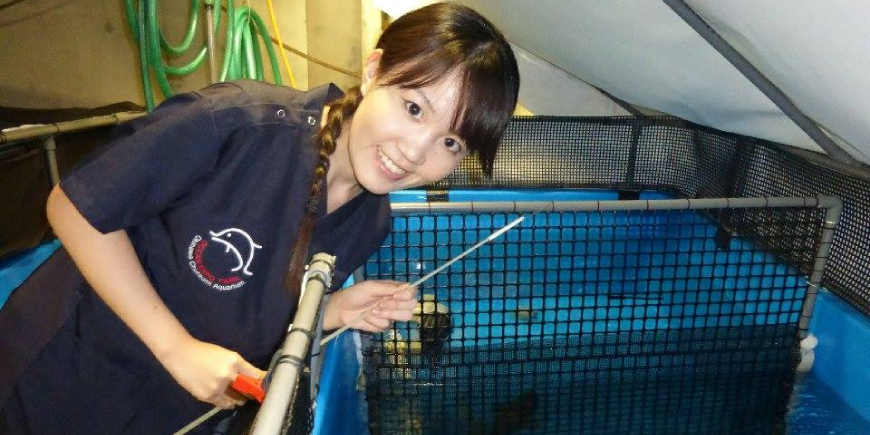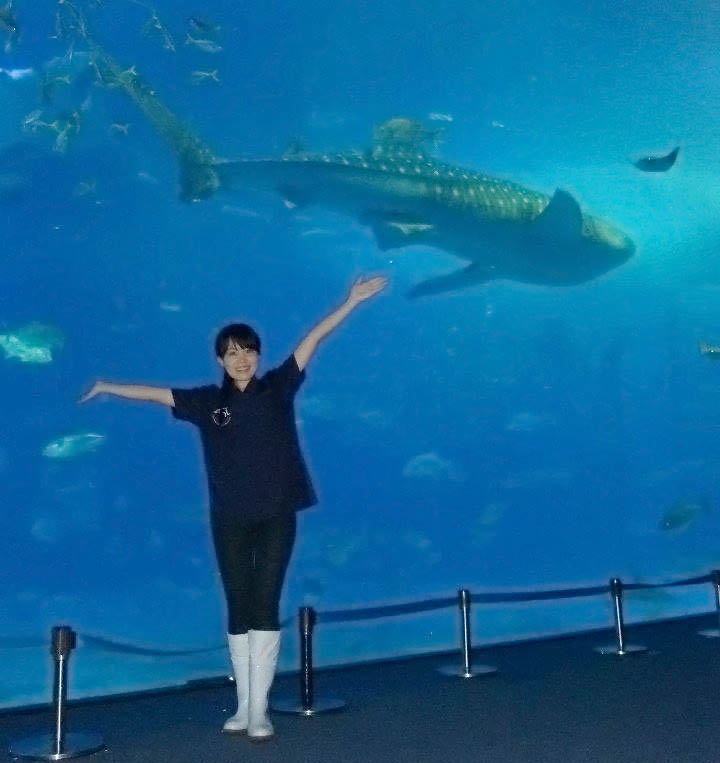
Tokyo-born Yuka Obayashi returned from her self-directed International Co-op at the Okinawa Churaumi Aquarium with a new-found appreciation for marine wildlife.
As an international student working towards a degree in Biological Sciences and a minor in Health Sciences (HSCI), Yuka prepared for her journey with the support of her family and through SFU’s resources. She took courses at SFU to prepare her dissection skills and attended networking events to connect with other students and professors travelling to Japan.
Upon landing in the Kunigami District of Okinawa, Yuka was immersed into a fusion culture of traditional and westernized Japan. Where she lived, it was not uncommon to see three or four generations of families living together juxtapositioned with the unexpected modern beachfront properties.
This “Japanese Hawaii” housed many of Yuka’s opportunities. She participated in early morning rescue and transfer missions for marine wildlife caught in fishing nets, explored various faculties within the national aquarium, handled office work with Japanese researchers, and even gained autonomy to conduct her own experiments.

Much of her work focused on elasmobranchs (sharks, skates, rays, chimaeras), particularly with respect to the aquarium’s well-known collection of whale sharks. Sharks and other invertebrates are sensitive to the copper sulfate that is commonly used to treat fish parasites in aquariums. Typically, these creatures are temporarily removed from their tanks during treatment, which demands a lot of time and effort from staff throughout the treatment process. On behalf of the Okinawa Churaumi Aquarium, Yuka conducted research on copper sulfate’s effect on shark species. “[The aquarium] asked me to find the cause of a disease or treatment methods for elasmobranchii,” she adds, “As SFU students, we have rights to access articles, so I used the library website all the time. It was really useful.” She learned copper sulfate causes osmoregulation problems for these creatures, as the copper binds to the gills of sharks, causing dehydration, illness, and potentially death, if not properly treated.
Her research further connected surprising similarities between shark and human biological processes. She found that sharks use Na+/K+-ATPase (sodium-potassium pump) for salt and ion excretion on their gill epithelium and rectal glands, just as humans use the pump for signal transduction in neural pathways and urine excretion through kidneys. Both elasmobranchs and humans use these enzymes to balance concentration gradients when propagating action potential and to maintain homeostasis through osmoregulation; however, it is important to note that humans and elasmobranchs may use different subunits of Na+/K+-ATPases at the molecular level. She also noted that many shark subspecies have similar anatomies to humans, particularly in regards to female sharks with placentas for the fetus to develop in. “This really changed my viewpoint.” Yuka comments, “[Sharks] have many ways of giving birth…some have placentas, so when I dissected them they actually had tiny sharks inside of their bodies.” Though there were some emotional experiences like these, Yuka “was really glad to work with sharks.”
Through this exciting and diverse Co-op experience, Yuka was able to put her lab skills, such as water analysis, blood sampling, and pH testing, into practice. “It’s not only about getting the sample and measuring it. I need to analyze why it gives that value,” says Yuka. Additionally, she gained experience in using and analyzing data from portable CT scanners and x-rays at the aquarium. She also improved her transferrable workplace skills in effective communication, time management, and organization, and is now applying them to her daily studies.
With the bar set high from her first work term, Yuka plans to continue her studies in Biology and HSCI searching for lab work here in Canada and hopes to gain experience in dealing with human health and wellness. “The funny thing is that, in this term, my professor somehow assigned me to study the osmoregulation of sharks. Everyone gets one article and I got it. Is it fate?” she ponders. “If I encounter sharks again, I might become a shark biologist…who knows?”
Beyond the Blog
-
Visit the International Co-op website to learn about opportunities like Yuka's.
















